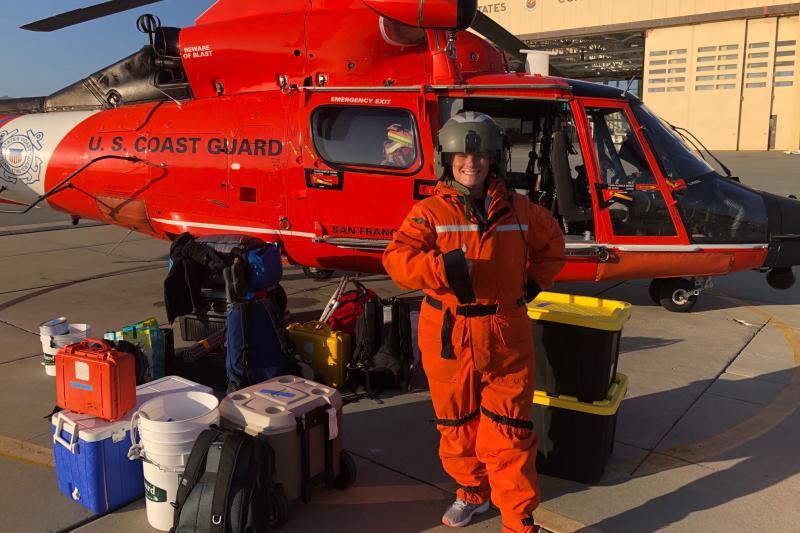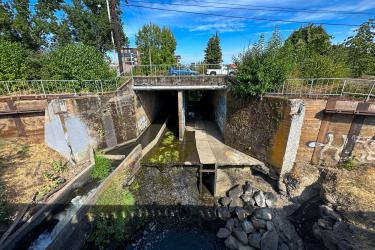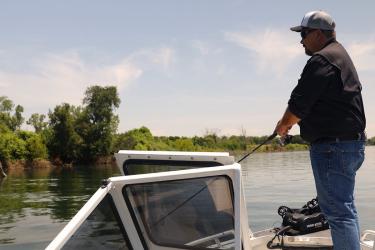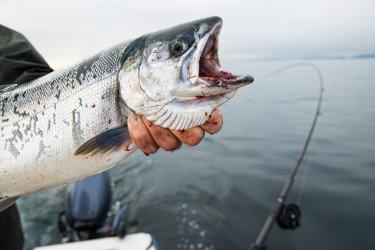What is your key responsibility in the Office of Habitat Conservation?
I have worked for NOAA’s Restoration Center for 20 years as a marine habitat restoration specialist. I work on restoring seagrass, kelp, rocky intertidal habitats that have been injured by oil spills and hazardous waste, and those that need extra help to make them healthy for fish. In my job I coordinate with other federal and state agencies, local governments, universities, and non-profit organizations. It is very rewarding to collaborate with so many people who want to improve our environment.
Where did you grow up, and what was your life like then? Are there cultural experiences that have influenced or are influencing you from that time?
I grew up in Southern California and I am a first generation U.S citizen. My parents are from Argentina and they emigrated to the United States in the 1960s. I was only allowed to speak Spanish at home—which I appreciate now—but growing up it was hard to be singled out as being different or from another culture. Being bilingual in California is an asset and I am able to communicate effectively with our Latino community.
Growing up my parents loved to explore California and almost every weekend my dad would pack up the van and off we would go camping. It was through those experiences, from the beaches to the mountains, that my love for nature grew. I realized by the time I was 10 years old I wanted a career in natural resources. I just recently found out that my grandfather in Argentina was the Director of Parks and Recreation in Buenos Aires … I guess it runs in the family!
What is your educational background?
I spent two years at a junior college earning an Associate in Arts, then went on to undergraduate school at Humboldt State University. I earned a Bachelors in Environmental Science and Biology, with minors in botany and Spanish.Then I went on to earn a Masters in Environmental Science and Management at the University of San Francisco.
Are you a member of a community organization, or do you volunteer or mentor others?
I volunteer to speak at local middle and high schools to describe my career and all the interesting work that I do. We have a very prominent Latino community and being able to communicate in Spanish has been an asset.
What habitat restoration work or projects have been especially successful or inspiring to you?
I have loved every moment of my career! I have the opportunity to work on restoration projects that have directly benefited fish and wildlife. I have worked on assessing impacts from the Deepwater Horizon oil spill in the Gulf of Mexico. I participated in the first deepwater dive in a one-person submersible watercraft that explored our national marine sanctuaries. I continue to assess seaweeds on a remote island off of California, where I started my career.
Is there a book, quote, or person that influenced you to be the person you are, or enter the field you’re in today?
I had a mentor at Humboldt State University who got me interested in seaweeds. He was invited by NOAA to do a survey of seaweeds on the Farallon Islands, a group of remote Islands off the San Francisco coast, but was unable to go. He suggested the lead scientist take me. That was the beginning of my career with NOAA.
This quote from SpongeBob SquarePants keeps me in the here and now and makes all my actions purposeful, "You never really know the true value of a moment, until it becomes a memory."
Interesting fact—the late creator of the SpongeBob series, Stephen Hillenburg, also went to Humboldt State and studied marine sciences! He graduated 5 years before me and later taught at the Orange County Marine Institute (now the Ocean Institute), not far from where I grew up in Dana Point.
What does National Hispanic Heritage Month mean to you?
It is an opportunity to remember that this country is made up of cultures that make us a richer nation. When you have people from diverse backgrounds, nationalities, and cultures, you're bringing a fresh array of perspectives to the table.
What advice would you have for today’s youth interested in a government, science or conservation career?
There are more and more opportunities these days to enter the sciences. As the climate is changing we need new ideas and solutions. Our youth are the future. I was never the best student, but I did have a passion for nature and a desire to succeed. Keep challenging yourself and keep your passion!





